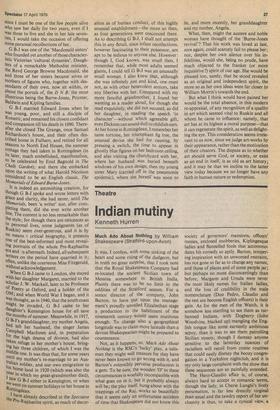Theatre
Indian mutiny
Kenneth Hurren
Much Ado About Nothing by William Shakespeare (Stratford-upon-Avon) It was, I confess, with some sinking of the heart and some rising of the dudgeon, but in truth no great surprise, that I took note that the Royal Shakespeare Company had re-located the ancient Sicilian town of Messina somewhere In British India. Plainly there was to be no limit to the oddities of the Stratford season. For a senior director of the company, John Barton, to have put upon the management's proudly unveiled Elizabethan stage a production in the habiliment of the nineteenth century would seem mutinous enough. To change also a geographical longitude was to claim more latitude than a devout Shakespearian might be prepared to countenance.
Not, as it happens, so. Much Ado About Nothing is the RSG's 'lucky' play, a talisman they might well treasure for they have never been known to go wrong with it, and Barton's ostensibly perverse production is a gem. To be sure, the wooden '0' in these circumstances is woefully incompatible with what goes on in it, but It probably always will be; the play itself, hung about with the trappings of the Raj, works so beautifully that it seems only an unfortunate accident of time that Shakespeare did not know this
society of governors' mansions, officers' messes, enclosed snobberies, Kiplingesque ladies and flannelled fools that accommodates his comedy so aptly. Barton, tempering inspiration with an unwonted restraint, has not gone so far as to change any names, and those of places and of some people jar; but perhaps no more disconcertingly than before; Margaret and Ursula were never the most likely names for Italian ladies, and the loss of credibility in the male nomenclature (Don Pedro, Claudio and the rest are become English officers) is their gain. As for the men of the Watch, it is somehow less startling to see them as turbanned Indians, with Dogberry (John Woodvine, blacked up) mangling the English tongue like some earnestly ambitious sepoy, than it was to see them patrolling Sicilian streets; though I daresay anyone sensitive to the latterday nuances of racialism will recoil from comic routines that could easily dismay the boozy congregation in a Yorkshire nightclub, and it is my only large complaint with the show that these sequences are so painfully extended.
The Hero-Claudio affair is, of course, always hard to accept in romantic terms, though the lady, in Cherie Lunghi's lively personation, is far less drearily virginal than usual and the tawdry report of her unchastity is thus, to take a cynical view, a
shade more feasible. It was the otherwise reverent John Masefield's grumble that her suitor behaved 'like one who is neither a lover nor a gentleman' and it might be added here that he behaves like neither a cricketer nor an officer, either; but it may be that the British in India made their own rules, and this Claudio (Richard Durden)— seems an acceptable member of a mess of chinless wonders whose most intellectual pursuit is potting at game birds between chota pegs. t can summon no confidence in their eventual union, which seems headed for a future of languid infidelities at country-house parties back home.
The engaging accommodation reached by Beatrice and Benedick—initially the acerbic disdainer of men and the sworn bachelor—is something else again. The sardonic cut-and-thrust in the felicitous exchanges of these two is handled by Juci Dench and Donald Sinden with an undertow of reluctant affection that gives their ultimate alliance a rare plausibility.. If they get an unlooked-for laugh at that notorious moment after the abortive wedding scene (as I fear they sometimes will), it will be the fault of the audience not the players. Miss Dench has prepared in everything she previously does the anguished indignation in which, distractedly sweeping up the confetti, the peremptory demand, 'Kill Claudio!' is forced from her lips; and Sinden's stricken, low-toned 'Not for the wide world' is calculated as perfectly as I have ever heard it done. Sinden had earlier shuttled expertly between high comedy and the mugging and nudging of a veteran music-hall comic, but he negotiates the key-change as surefootedly as a mountain chamois—or, come to that, as Miss Dench. A star danced when both these performances were born.



































 Previous page
Previous page